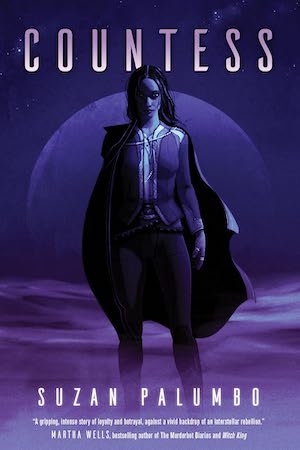Virika gave up everything for the Æcerbot Empire. She gave up her family, her culture, her past. She left behind all that her ancestors from the British West Indies brought with them when they fled a devastated Earth and became known as Exterran Antilleans. She left behind everything they created in their new hostile homeland where rights were for citizens and they could never attain citizenship. She found imperial patrons to raise her up and sponsor her career in the military. Finally, she landed a captaincy, only to have it all taken away on false charges and life in prison.
While rotting away in a bottomless pit, she meets a kindly jailer with a guilty conscience. With her help, Virika is able to escape, find a stash of pirate’s booty, and plan her revolution. The only way her people can finally be free is if the Æcerbot Empire no longer exists, or at least not in its current form. Virika wants revenge but she also wants peace. Perhaps she can talk and compromise her way into both. Or perhaps blood will have to be spilled. Either way, Virika will never surrender again.
Buy the Book

Structurally, the story is both fast-paced and slow-moving. I can see how some readers might be frustrated by that. Readers who want a more in-depth retelling of The Count of Monte Cristo instead of something taking inspiration from it and readers who aren’t used to novellas or the weird fluidity of short speculative fictions might walk away from Countess wishing Palumbo had written a full-length novel instead. But I think Palumbo made all the right choices. We don’t need to spend chapters upon chapters on Virika’s imprisonment in The Pit in order to understand how it broke her down and gave birth to a whole new version of herself. We don’t need to dawdle in her interactions with Lyric the betrayer or Alba the Æcerbot girlfriend in order for the final confrontation to be meaningful. It is best approached not as an adaptation but as something inspired by or a remix of Alexandre Dumas’ classic. Even at 168 pages, it’s full of adventure, romance, violence, and rebellion. It’s exactly as long as it needs to be.
What I appreciate the most about Countess is how Suzan Palumbo doesn’t let the future off the hook for present-day oppressions. In science fiction, the future is often imagined as post-racial, an era where your class and which part of the galaxy you were raised in matter more than “antiquated” ideals of skin color and Earth geography. While the sentiment is nice to think about, I think it’s also kind of a cheat.
Every modern Western society was built—intentionally and eagerly—on foundations of oppression and exploitation fueled by racism. Even the way we talk about exploring the galaxy hearkens back to this Age of Exploration, with scientists and entrepreneurs alike wanting to establish colonies and settle the final frontier. We think about colonizing space the same way American pioneers thought about “taming the West” and Manifest Destiny, that the land is devoid of life and exists solely so we can claim it, build cities on it, and extract every resource without impunity. We don’t talk about who will build those colonies or where we will get the materials needed to establish them. We don’t talk about who will be sent to extract those extraterrestrial resources and manufacture them into usable products. We don’t talk about who can afford to fund space trips and who will be in charge once the colonies are established. If we’re building a new system inspired by a racist, oppressive old system, why would we think it would be any better?
Countess digs into that tension in some fascinating ways. Virika’s Earth-born ancestors were from the Caribbean. Her roots are bound up in the Indigenous people who were there first, the European colonizers who brutalized everyone with their weapons and diseases, the enslaved Africans forced to labor there, and the Indians indentured on the sugar plantations. You can’t erase that or act like just because it happened on a distant world hundreds of years ago, the descendants will no longer carry those influences in their cultures and traditions.
Virika’s ancestors on Earth were nearly crushed by climate change (caused largely by Western capitalism), and the only option for survival was to do what their ancestors had done and indenture themselves to Western-owned corporations. Now, Virika’s people live on various planets as laborers, manufacturers, miners, and farmworkers. They are virtually stateless with few rights and no wealth. To help her family, Virika must surrender her culture and assimilate into Æcerbot society, and even that isn’t enough for the empire. To them, she will always be second class and unworthy. They are all too willing to believe her capable of treason and murder. Her body, her sense of self, her identity is degenerate in their eyes; her queerness even more so. She can never be like them. And eventually she realizes she doesn’t want to be.
Suzan Palumbo’s Countess is an exceptional science fiction remix of The Count of Monte Cristo. It explores the same themes, but takes them in new and exciting directions. Between this and last year’s nearly perfect short story collection The Skin Thief, she has quickly proven herself a force to be reckoned with in speculative fiction.
Countess is available from ECW Press.

